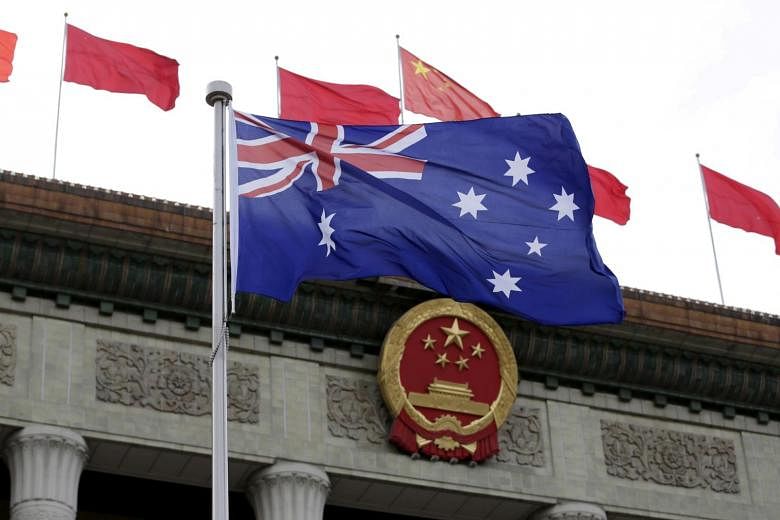BEIJING (AFP) - Spying charges, calls for a probe into the origins of Covid-19, and now anti-dumping measures on wine - tensions between Australia and its biggest trade partner China have soared this year.
Here is a look at how the dispute started and how it is deepening virtually by the week.
Coronavirus origins
Australia in April joined the United States in calling for a thorough investigation into how the coronavirus transformed from a localised epidemic in central China into a pandemic - triggering outraged warnings from the Chinese ambassador to the country.
Mr Cheng Jingye said demands for a probe could lead to a consumer boycott of Australian wine or tourist trips, adding that the push for an independent inquest was "dangerous".
The call by Canberra, which enraged China, is seen in Beijing as a US-backed attempt to discredit it.
Trade hit
The rift has since left Australian exporters exposed, with China imposing a series of retaliatory bans on agricultural products such as beef, barley and timber.
Weeks after Mr Cheng cautioned of a consumer boycott, Beijing suspended imports from four major Australian beef suppliers.
Neither side openly linked the suspension to the call for inquiry, citing technical issues instead.
But China soon after announced anti-dumping tariffs on barley as well, and its latest measures taking aim at Australian wine.
Detention and spying
Another area of contention involves high-profile Australian citizens detained by China: writer Yang Jun and journalist Cheng Lei.
Chinese-born Yang, who also goes by the pen name Yang Hengjun, was taken into custody in January last year and faces spying charges, which he denies.
Australian Foreign Minister Marise Payne previously decried China's treatment of Yang as "unacceptable".
Cheng, an anchor for China's English-language state broadcaster, has been held since at least Aug 14, but Australian diplomats said Beijing has given no reason for her detention.
In September, two Australian journalists were rushed out of China after police sought to question them, while Beijing accuses Canberra of raiding its journalists' homes as it investigates an alleged covert influence campaign.
Outrage and more outrage
This month, Beijing released a laundry list of its complaints about Australia, with a Chinese official repeatedly telling three prominent outlets: "If you make China the enemy, China will be the enemy."
The complaints include Australia's tough foreign interference laws and its ban on tech giant Huawei's involvement in the country's 5G network. The document also claimed Canberra engaged in "incessant wanton interference" in China's affairs.
On Monday (Nov 23), Prime Minister Scott Morrison decried mounting Chinese pressure and rejected the portrayal of Australia as a US lapdog, saying it was wrong and "needlessly deteriorates relationships".
'Five Eyes' kickback
Australia is among Western allies - the so-called "Five Eyes" - accusing China of violating its legally binding international commitments on Hong Kong after imposing a tough security law on the city.
The United States, Britain, Australia, Canada and New Zealand hit out this month at China for ousting pro-democracy lawmakers from Hong Kong's legislature.
But attempts to build a united front against China provoked a typically terse response from Beijing.
A foreign ministry spokesman warned: "No matter if they have five or 10 eyes, if they dare to damage China's sovereignty, security and development interests, they should beware of being blinded."

